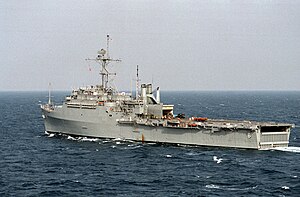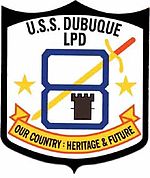USS Dubuque (LPD-8)
47°33′10″N 122°39′09″W / 47.5527306°N 122.6523807°W

| |
| History | |
|---|---|
| Name | Dubuque |
| Namesake | the city of Dubuque, Iowa |
| Ordered | 25 January 1963 |
| Builder | Ingalls Shipbuilding |
| Laid down | 25 January 1965 |
| Launched | 6 August 1966 |
| Commissioned | 1 September 1967 |
| Decommissioned | 30 June 2011 |
| Stricken | 13 November 2017 |
| Identification | Hull number: LPD-8 |
| Motto | Our Country: Heritage, and Future |
| Nickname(s) | The Mighty 8 |
| Honors and awards |
|
| Status | Stricken, Final Disposition Pending |
| Badge |  |
| General characteristics | |
| Class and type | Austin-class amphibious transport dock |
| Displacement | |
| Length |
|
| Beam |
|
| Draft | 23 ft (7.0 m) maximum |
| Decks | well deck 7,000 sq ft (650 m2) |
| Ramps | 2 |
| Installed power | 24,000 per shaft (2 shafts) |
| Propulsion | Two 600 psi (4,100 kPa) Foster-Wheeler boilers, two Delaval steam turbines, two shafts |
| Speed | 21 knots (39 km/h; 24 mph) |
| Boats & landing craft carried | 2 RHIB |
| Capacity | cargo capacity 2,500 tons |
| Complement | 24 officers, 396 enlisted, 840 marine troops, 90 flag/staff personnel |
| Armament |
|
| Aircraft carried | Two CH-46/CH-53 equivalents, or four UH-1/AH-1 equivalents, or two AV-8B Harriers |
| Aviation facilities | 1 hangar |
USS Dubuque (LPD-8) is an Austin-class amphibious transport dock of the United States Navy.
USS Dubuque is the second ship named after Dubuque, Iowa on the Mississippi River and her founder, Julien Dubuque - a French Canadian explorer. USS Dubuque was commissioned on 1 September 1967 at Norfolk Naval Shipyard in Portsmouth, Virginia.[1]
History
Dubuque's
From 1968 until 1975, She made five Western Pacific deployments that saw extensive duty in Vietnam. In a highly publicized event in October 1968, the ship returned 14 repatriated
On 15 August 1985 Dubuque departed San Diego for her new homeport of
In May 1988, she deployed to the
Immediately following the
In November 1998 Dubuque again deployed to the Persian Gulf as part of the
On 30 July 1999, Dubuque was relieved by
From June to September 1999, Dubuque participated in the first SHIP-SWAP with her sister ship Juneau, where each ship's crew remained in their original home ports, allowing Dubuque to return to the homeport of San Diego.
From January to July 2003 Dubuque was deployed with
Dubuque deployed again in 2008 with the Peleliu Expeditionary Strike Group. Her crew participated in the pursuit of identifying pirates and collecting intelligence on piracy off the Gulf of Oman and the Horn of Africa. She also participated in rescuing six mariners from a sinking vessel off the Philippine coastline on the way to the Persian Gulf.[2]
In early May 2009 Dubuque had to abort a humanitarian aid mission to the South Pacific after a sailor on board developed
On 9 September 2010, Marines attached to the 15th Marine Expeditionary Unit's Maritime Raid Force launched from Dubuque and boarded and seized control of the German-flagged MV Magellan Star off the coast of Somalia. The pirates had taken control of the ship the previous day. The Marines captured nine pirates and rescued eleven crew members who had taken refuge in a "safe room" on the ship. No shots were fired and no injuries were reported.[4]
USS Dubuque was officially decommissioned on 30 June 2011.

Swine flu outbreak
In May 2009 the Navy announced that a sailor on the ship had been confirmed as infected with Influenza A virus subtype H1N1 during the worldwide 2009 swine flu pandemic. Fifty more of the ship's sailors were suspected to have also been infected. As a result, the ship's June 2009 deployment to Oceania in support of the Pacific Partnership program was canceled.[5]
Awards

According to the Navy Awards website [2], Dubuque has received one
Notes
- ^ "Ourship.aspx". Archived from the original on 20 July 2011. Retrieved 6 September 2011.
- ^ [1].
- ^ "US navy halts aid vessel over flu". BBC News. 6 May 2009. Retrieved 6 May 2009.
- ^ "U.S. forces board pirate-captured vessel, seize control". CNN. 10 September 2010.
- San Diego Union-Tribune, 5 May 2009.
